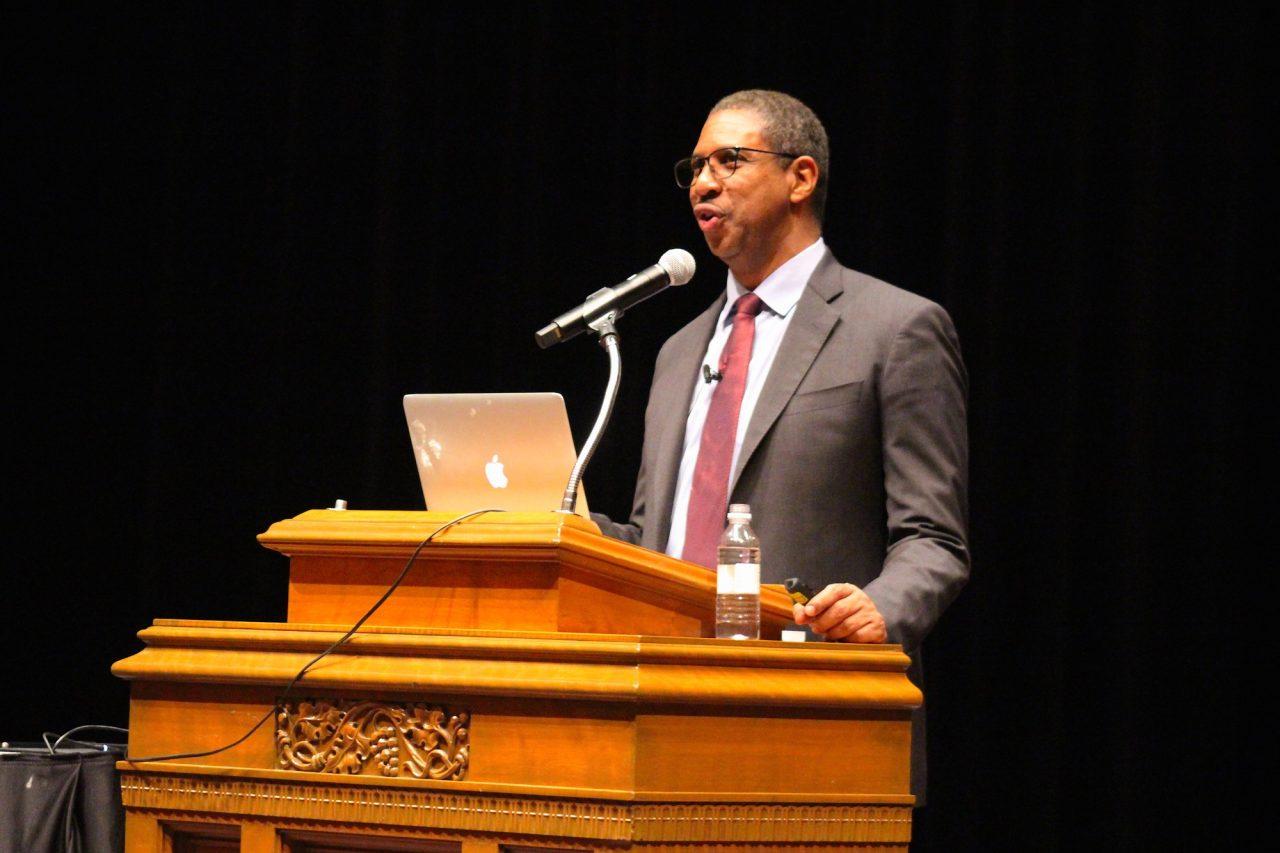Photo by Martina Almeida
“Think ‘Hidden Figures’ meets ‘Black Panther’ meets ‘Menace to Society,” said Hakeem Oluseyi to a modest crowd of around 100 students, faculty and community members in Laurie Auditorium Wednesday evening. “You’re going to get a sanitized version.”
Oluseyi is an astrophysicist, inventor, and regular science television commentator. Currently, he is a professor at the Florida Institute of Technology.
Physics professor Niescja Turner announced that the post-lecture star viewing hosted by the Department of Physics and Astronomy had been canceled due to weather.
Oluseyi was introduced by senior physics major Madelaine Griesel, who, according to Turner, had presented research at the American Astronomy Society and had danced ballet since the age of five.
“She forgot to mention that I’m also a trained ballet dancer,” Oluseyi joked as he took the podium. This set a tone for Oluseyi’s comic retelling of his at times dark journey to becoming a world-renowned astrophysicist. Oluseyi informed the audience that he has a biography coming out in March 2021 and that he recently had a movie deal.
Oluseyi focused on his journey over giving a more science-based lecture because he’s found that people find him “inspiring.” But first, he engaged the audience in a thought experiment.
“Imagine that you’re so small, that the size of a human cell to you is the size of the galaxy to us,” Oluseyi said. “So imagine that you are in the leg of an elephant. And you look around, you’re like, ‘Oh, there’s a bone cell. There’s a muscle cell. There’s a blood cell. There’s a nerve cell?” Do you have any idea what a elephant is? Not at all. That could be what’s going on when we’re observing the universe. That concludes the astronomy portion of my talk.”
Oluseyi, the first in his family to graduate college, went on to talk about his childhood, during which he moved often between the Ninth Ward of New Orleans, south central Los Angeles, where his cousins were members of the Crips gang, Houston’s Third Ward and rural Mississippi, where his father ran an “agricultural” business that “would be legal now in certain states.” He finally settled in Mississippi at age 11.
“Mississippi evaluated all the schools in an effort to make the schools better,” Oluseyi said. “Every school in the state was given a grade, and it was a rating from one to five. And one was the best, five was the worst. And luckily, only four schools got the lowest score of five. Two of them were my junior high and high school.”
After high school, Oluseyi joined the Navy but was discharged when it was discovered that he had a certain skin condition. Then, Oluseyi attended Tougaloo College in Jackson, Mississippi. After a professor nominated him for a summer research position at the University of Georgia, Oluseyi discovered that research was his passion. Ultimately, Oluseyi ended up in a Ph.D program at Stanford University.
Throughout his lecture, Oluseyi stressed the importance of working hard, but also that he didn’t get to where he is today without help, and for that reason, he has done a lot of work in making science accessible to underprivileged students around the world.
“Because one thing you see in my story is if you see someone who’s supposedly successful, they can talk about all here’s how hard I work. And here’s what I do and how smart I was. But throughout my stories, it was all about people helping me out. Right? And so I realized what I got to Stanford, I looked around at those people and I said, these people like smarter than the people back in this city, and they damn sure ain’t hard work, right. And so I felt it was an injustice that, you know, knowledge is proprietary.”
After his lecture, Oluseyi took questions from the audience.
“I was curious about your opinion on what we can do if we’re not educators or for non-Ph.D’s in astronomy, to fill in these gaps so that you have opportunities,” said senior Kailey DeLuca.
“But I really think that in order to educate kids and have to educate the adults, because what I see is that long before you step foot in the school, there’s a lot that already happens in those first five years,” Oluseyi said. “So I tell my son, when people say, ‘Oh, you’re really smart.’ No, you’re not really smart. You’re really educated. And you should recognize that if you don’t work, you’re not gonna get far or do better.”







